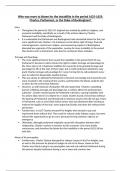Who was more to blame for the instability in the period 1625-1629:
Charles, Parliament, or the Duke of Buckingham?
Intro:
Throughout the period of 1625-29, England was marked by political, religious, and
economic instability, specifically as a result of the actions taken by Charles,
Parliament and the Duke of Buckingham.
It is undeniable that Parliament and Buckingham hold substantial blame for this, but
more significant was Charles I. His insistence on the divine right of kings, financial
mismanagement, control over religion, and unwavering support of Buckingham
alienated key segments of the population, causing far more instability in the period
than factors such as Parliament, who tried to counteract these mistakes.
Tonnage and Poundage
The most significant factor that caused the instability in the period 1625-29 was
Parliament’s decision to deny Charles the right to collect tonnage and poundage for
life. Since Henry VII, it had been tradition for monarchs to be granted tonnage and
poundage for life at the start of their reign, but in 1625 parliament decided to only
grant Charles tonnage and poundage for 1 year, forcing him to call parliament every
year to collect his desperately needed money.
This was clearly an attempt by Parliament to become increasingly more powerful and
more involved in the running of the country, and therefore the blame could be laid
on them for the events that followed.
However, as with historian Christopher Hill who stated that “Charles’s unyielding
pursuit of lifelong tonnage and poundage was a reckless affront to parliamentary
authority”, Charles reacted poorly to Parliament’s decision, causing instability with
his actions that only he is to blame for. In 1626, Charles issued a forced loan without
the backing of Parliament and threatened to imprison anyone who did not pay. Many
in Parliament, such as Lord Chief Justice Carew, who was dismissed after refusing to
endorse the legality of the loan, were angry that Charles had done this without their
permission.
Furthermore, in 1627 Charles arrested Five Knights who refused to pay and
imprisoned them without trial. They sued for release under habeas corpus, but were
refused the opportunity to go to court, because the king claimed a right to an
emergency.
Ultimately, although parliament originally caused this disruption between their
relationship, Charles’s actions in reaction to this economic crisis were totally
unnecessary, and therefore the blame for this instability in the period 1625-26 lies
with him.
Abuse of his prerogative
Furthermore, Charles’ blatant disregard for Habeas Corpus in the Five Knights case,
as well as the pressure he placed on judges to rule in his favour, shows us that
Charles was clearly trying to use prerogative rule and rule without Parliament during
this period, despite Parliament having a say in taxes and common law.




